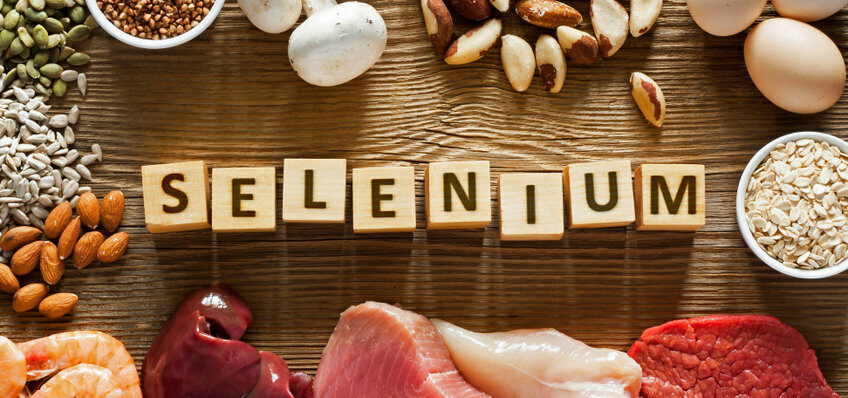
There is plenty of debate on what foods are best for pressing the pause button on aging. However, one of the minerals most commonly associated with anti-aging effects is selenium. Although it is best to follow a cohesive diet or eating pattern for long-term health, certain foods in case studies have been proven to be key to longevity. Considered necessary for optimal health, studies show that this trace element regulates antioxidant activities in the body, combatting aging as a result. Discover the potential health benefits selenium offers, popular sources of this mineral, and whether it can truly slow aging.
Why You Need This Mineral
Like many essential vitamins and minerals, this is important for facilitating bodily processes¹, such as
- Thyroid gland functioning
- Reproduction
- DNA production
- Fighting free radicals
- Preventing infection
In addition, the amount of this nutrient needed by each person depends largely on their age. For adults, the recommended daily intake of this mineral is 55 mcg, whereas pregnant women need around 60 mcg. According to the National Institutes of Health², the recommended upper daily limit (or maximum) is:
| Ages | Upper Limit |
|---|---|
| Birth to 6 months | 45 mcg |
| Infants 7-12 months | 60 mcg |
| Children 1-3 years | 90 mcg |
| Children 4-8 years | 150 mcg |
| Children 9-13 years | 280 mcg |
| Teens 14-18 years | 400 mcg |
| Adults | 400 mcg |
While selenium deficiency is uncommon in the United States and Canada, some possible side effects of not getting enough of this mineral are infertility in men and a type of heart disease known as Keshan disease.
Which Foods to Eat
Some common foods¹ rich in selenium include:
- Tuna
- Halibut
- Sardines
- Shrimp
- Roasted Ham
- Turkey
- Chicken
- Beef Liver
- Eggs
- Bread
- Cottage Cheese
- Brazil Nuts
- Brown Rice
- Baked Beans
Furthermore, it is possible to take supplements to boost your consumption of this trace element. Currently, however, no evidence³ shows that this is beneficial for individuals who aren’t at risk for selenium deficiency. However, individuals who are prone to this deficiency include anyone who is HIV-positive and those suffering from kidney failure with hemodialysis.
YES! Selenium Affects Aging
As a nutrient that naturally decreases with age, low levels of this mineral have previously been associated with cognitive decline. Alongside delaying loss of cognition, selenium supplementation in the elderly has been shown⁴ to reduce DNA damage, minimize inflammation, and prolong telomere length. A study⁵ published in Clinical Chemistry in 2005 detailed how it followed 1389 subjects for 9 years analyzing selenium levels in plasma to determine their influence on aging. Through randomized trials and 6 follow-up periods, researchers were able to determine that this nutrient is essential to maintaining health in aging individuals. Though we caution against labeling this nutrient as the cure-all for aging, there is clear evidence that it contributes to maintaining health, especially in aging populations.
References
- Barrell, Amanda. “15 High Selenium Foods: Why We Need Them, and More.” Medical News Today, MediLexicon International, 5 May 2021, https://www.medicalnewstoday.com/articles/foods-with-selenium.
- “Selenium.” NIH Office of Dietary Supplements, U.S. Department of Health and Human Services, https://ods.od.nih.gov/factsheets/Selenium-Consumer/.
- “Selenium.” The Nutrition Source, Harvard T.H. Chan School of Public Health, 19 Oct. 2021, https://www.hsph.harvard.edu/nutritionsource/selenium/.
- Cai, Zhonglin & Zhang, Jianzhong & Hongjun, Li. (2019). Selenium, aging and aging-related diseases. Aging Clinical and Experimental Research. 31. 10.1007/s40520-018-1086-7.
- N Tasnime Akbaraly, Josiane Arnaud, Isabelle Hininger-Favier, Veronique Gourlet, Anne-Marie Roussel, Claudine Berr, Selenium and Mortality in the Elderly: Results from the EVA Study, Clinical Chemistry, Volume 51, Issue 11, 1 November 2005, Pages 2117–2123, https://doi.org/10.1373/clinchem.2005.055301
Ashuni Pérez is a writer in the culinary, as well as health and wellness industries. With a background in teaching and digital media, she loves to learn and help others discover more about their food, where it comes from, and how best to prepare it. A foodie through and through, she is always searching for new recipes and the freshest ingredients.











Leave A Comment